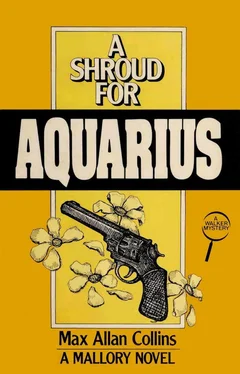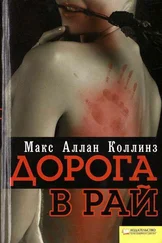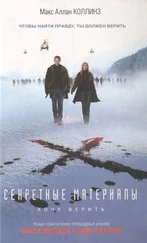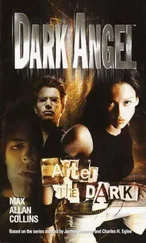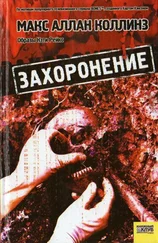He was on me, a thousand pounds of him was on me, unless I’d killed the Frigidaire and it fell on me, and the gun wasn’t in my hand anymore. I had the presence of mind to grab the arm with the knife, with two hands, but the son of a bitch was strong, and then an arm looped around his neck and a hand pulled off his mask, and I got a good look at him being surprised and pissed — green eyes, broken nose, wide mouth, scarred cheekbone — as he must not have known anybody else was in the house.
He stood, tossing Jill off him like a nude little monkey, and she smacked into and rattled against the wounded refrigerator. You would’ve thought he’d have appreciated having a beautiful naked woman like Jill latch onto him, but no...
Nor did he appreciate me butting him in the nuts; he was tough, but nobody’s tough enough to withstand that, and he sat on the floor and clutched his privates, the knife clunking to the linoleum, and I did something I didn’t know I was capable of: I looked quickly around for and picked up his automatic and smacked him with it, on the side of the head, as hard as I possibly could.
While he was still unconscious, we tied him up with clothesline, called Sheriff Brennan, and put on some clothes. I took time out to pee. Then, waiting for Brennan, I checked the guy’s pockets and found no ID. The gun was a nine millimeter Smith & Wesson; the silencer was a round tube with perforations, apparently homemade, but slickly so.
Brennan was there in five minutes, and the guy was still unconscious.
Pushing his Stetson back on his head, kneeling, Brennan touched the guy’s head; it was bloody, clotting up. The black shirt around the one shoulder was damp with blood, too.
“Hit him alongside his head a mite hard, wouldn’t you say?”
“He shot at me in my goddamn kitchen,” I said. “What do you expect me to do?”
Brennan stood, hands on hips, shrugging. “I don’t think you killed him.”
“You don’t think...” My stomach dropped. “Jesus, I didn’t mean...”
“It ain’t like TV,” he said solemnly. “Most people don’t take blows to the head lightly. I better call a ambulance.”
He did.
Jill and I stood in the living room — the big, black-clad intruder was slumped, trussed up in clothesline, on the kitchen floor, his back to the cupboards and drawers, where I’d got the butcher knife. We hugged each other, feeling like we knew each other very well now. Sharing unexpected violence in the night brings people together. The family that slays together stays together.
“Be here in two shakes of a lamb’s tail,” Brennan said, coming back from the phone. He took the Stetson off, brushed greasy hair off his forehead. “You know that feller?”
“Sure. He lives next door. He wanted a cup of sugar, but he forgot to say please.”
Brennan laughed, but not because he thought my limp crack was anything to laugh about. “You’re a pretty tough hombre, ain’t ya, Mallory?”
“You got me into this, dammit!”
His face turned serious. I couldn’t believe he hadn’t made a connection between this and Ginnie Mullens yet.
He said, “You think this has something to do with little Ginnie dyin’?”
“For two days I’ve been asking around about her, including talking to her drug connection in Iowa City. Then suddenly Arnold Schwarzenegger in a ski mask comes calling at midnight. What do you think?”
Brennan thought about it. “He have any ID on him?”
“No.”
The sheriff let some air out. “He don’t look like a cat burglar at that.”
“He’s a guy with a gun with a silencer. How do you read it?”
“Like somebody took out a contract.”
“Me, too.” I glanced at Jill. She had the drawn face of a woman who hadn’t slept for days. “Forgive me for thinking like a mystery writer.”
“That’s okay,” she said. “Any time a guy in black comes in your house with a gun with a silencer, you got my permission to think like a mystery writer. By the way, does this sort of thing happen to you often?”
“First time this week,” I said. “Brennan, this guy is obviously not local.”
He nodded. “This kind of thing can be set up in these parts. There are bars in South End where you can set up a hit for a hundred dollars.”
“That’s a generous estimate,” I said, thinking of certain bars in that part of town. “But I don’t think this is a hundred-dollar contract.”
“Me neither,” Brennan admitted.
The wail of an ambulance interrupted us, and soon we were untying our slumbering charge and he was being loaded onto a stretcher; Brennan kept a gun on the slack figure in case he was “playin’ possum.” He sent a deputy along in the ambulance, and stayed behind with me.
We stood in front of my house. On the corner across from me, there is no house, simply a bluff, way down at the bottom of which is the Mississippi, which I can see from my place. A nearly full moon was shimmering on the river, rippling there. The winking amber lights of barges, having just come through the lock and dam, multiplied themselves in reflections on the water.
Jill went back inside to put herself together, while Brennan and I stood looking across the street toward that bluff where the river and the trees beyond it formed the horizon.
He said, “I didn’t mean to get you in anything this deep.”
“This was nothing either one of us could predict.”
“Maybe you ought to stop. Maybe we ought to sit down tomorrow, and you fill me in on what you’ve got, and just call it a day. I’ll do my best to take ’er from there.”
“I appreciate that, Sheriff. But I better see this through.”
I don’t believe what he said next, because he said it without a trace of humor.
“Well,” he yawned, “a man’s gotta do what a man’s gotta do.”
I just looked at him.
He gave me a slip of paper. “Address of Ginnie’s hippie husband, up in the Cities. Case you want to talk at him.”
In spite of what I’d been through, I found a grin. “Much obliged, Sheriff,” I said.
He tipped his Stetson, said, “Keep outta trouble,” and drove off, siren silent.
Inside, I turned the burglar alarm system on, including the loud alarm I usually left off.
Jill was waiting.
She was in bed. She was naked.
And, no longer strangers, we made love, with a slow, yearning quality that came out of a heightened awareness of our mortality.
We didn’t even turn out the lights.
And we weren’t embarrassed at all — before, during, or after.
The next morning I was driving on Highway 61, squinting into a bright sun; me, I didn’t feel so bright. Jill had left early, barely after sunup, to go home and shower and get ready for work; she seemed more shaken, more troubled this morning than she had in the thick of things last night. Holding each other in the dark had made getting through the early morning hours a snap; getting through the day on our own would be a whole ’nother deal.
I hadn’t been able to get back to sleep after Jill left, so at nine o’clock I was sitting at the Sports Page having breakfast — biscuits and gravy, very good but settling in my stomach like an anchor. Shortly after I was on the road. I felt a little stiff from my skirmish with the guy in my kitchen last night, and a little uneasy about the direction my unofficial investigation into Ginnie’s death was taking. Specifically, that direction was (at the moment anyway) the Quad Cities, which despite its name included half a dozen cities and a handful of smaller municipalities, about a half-million population’s worth sprawled along either side of the Mississippi River as it separated Iowa from Illinois.
Ginnie’s husband, J.T. O’Hara, whose absence at his wife’s funeral had puzzled me, managed a used-book store atop Harrison Street hill in Davenport, on the Iowa side of the Quad Cities. Because Harrison is a one-way falling downhill toward the river, I had to travel the uphill one-way of Brady, and circle around. Once I’d parked, I felt as though I’d stepped not from my car but out of a time machine taking me into 1969.
Читать дальше
